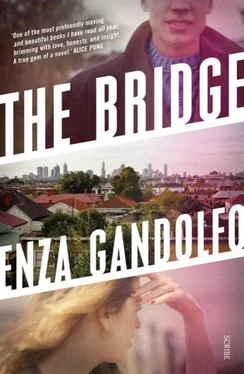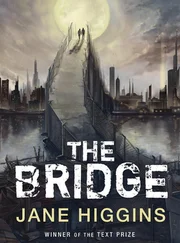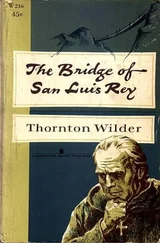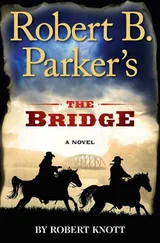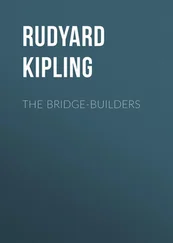Sam came back with a beer and some salt and vinegar chips.
‘Haven’t had these for years, they’re so salty.’ Antonello opened the packet and took a chip.
‘You need to drink beer with them,’ Sam said, pushing the packet closer to Antonello. ‘Anyway, Gary was the one who convinced me to get more involved in the union when we went back to finish the bridge. We ended up on strike straightaway because they didn’t want to let the shop stewards on the job. Can you imagine: they wanted us to forget the accident and work on the bridge as if nothing had happened?’
Antonello didn’t say anything, and Sam continued, ‘Okay, maybe Gary was racist — things were different then — but he’s been a good mate, and together we’ve done important work.’
Antonello frowned. Was that kind of racism defensible? Sam was defending Gary, a man who had been awful to all the Italians, to the Greeks and the Yugoslavs. Had Gary’s good work compensated for it? Could everything and anything be forgiven?
‘So many workers are killed each year in industrial accidents, and the companies can’t be trusted to do the right thing, and we pay for it with our lives. The accident on the east side in ’72, another death — it was the last straw. This work is my legacy, my way of taking what happened on the bridge and doing something with it. It’s given me a purpose, a battle to fight. ’
‘I still have nightmares,’ Antonello said. He hadn’t told anyone about the nightmares, not even Paolina, though of course she knew. ‘And sometimes a noise — a bolt of thunder, a car backfiring, a jackhammer — and I’m back under the bridge looking up, and I can see the whole fucking thing moving and the men falling… and it’s as if Bob and Slav are saying, “Don’t forget us. Don’t fucking forget us.”’
‘Look, mate,’ Sam said, leaning across the table, ‘I don’t think Bob or Slav or any of the other blokes would want you to spend your life suffering. They’d want us to be happy, like we would’ve wanted them to be happy if things were the other way around. We paid for that memorial, the unions and the blokes — the government and the companies wanted to forget the whole fucking thing, but we wouldn’t let them. We haven’t forgotten them. Fuck, we’ll never forget them.’
‘I should’ve died that night. It was meant to be my shift. I was supposed to be up there and Ted was supposed to be on the ground. We did a switch.’ Antonello had mostly kept silent about the switch in shifts. He’d told himself it would only make things worse for Ted’s family.
‘Nello, it’s been thirty-nine years. None of those blokes deserved to die, and if we’d died we wouldn’t have deserved to die. It was the fault of the companies. Not your fault. Not my fault.’
‘But I saw stuff that was wrong and I didn’t —’
‘Yeah, we all did. That’s what we are trying to change — workers’ and bosses’ attitudes, both. Trying to get workers not to ignore problems, to stand up and say when things are wrong. But it’s tough. Who wants to risk losing their job?’
‘Or lose faith? We were all so committed. We loved that bridge. We thought we were big bridge builders, some kind of heroes.’
‘We were proud of what we were doing. Nothing wrong with that.’
‘We were fools, Sam. Fodder for the companies, for the government. The bridge, that was the important thing — the bridge and joining the bloody city together and progress. And they used us and we fell for it, for the whole thing. We fell for it.’ Antonello had forgotten where he was and his voice had risen. The chef and the barman stopped playing pool and stared at him. He wanted to yell, at Sam, and at the two young men who probably had no idea that thirty-five men had died building the West Gate.
‘Sorry,’ he said, and the chef went back to play his shot. Antonello watched him lean across the pool table, the cue aimed at a ball in the far corner. He was focused on the game, taking his time, shifting to the right and back, and again, as if nothing else existed. It took him three shots to finish the game. The barman laughed. ‘At this rate, I’ll still be paying for your drinks into the next century.’
‘And now Ashleigh,’ he said to Sam in a quieter tone.
‘How is your family coping?’ Sam asked.
‘They’re struggling. Alex is a mess. My daughter-in-law hasn’t left the house for weeks. She’s obsessing over the court case and Jo — the young woman who was driving — and making sure that Jo pays. As if locking the girl away will make everything better.’
Sam reached out and put his hand on Antonello’s shoulder.
‘I was an absent father even though I was home. Even when I was playing games with them, I wasn’t there. But now, watching Rae and Alex, I see how obvious it is when parents aren’t coping. My granddaughter Jane is so sad. She misses her sister and now her parents are falling apart. She stayed with us a couple of nights, and with some friends too, but it’s tough. She’s closest to her mother.’ He paused. ‘I was a poor role model. Paolina has been the strong parent. She’s held the family together, but now she’s sick, so she can’t do it.’
From the gaming room the loud beeps and bells of a slot machine jackpot broke out, followed by exclamations and laughter. Antonello felt like a man waking up in the middle of the night to a neighbours’ party and realising that while he was sleeping other people were living.
On 15 October, the thirty-ninth anniversary of the collapse, there was a small gathering at the memorial under the bridge. Sam rang and invited Antonello, but he made excuses and didn’t go. Instead, he waited until late afternoon and went to the bridge on his own. He tried to remember the days, the weeks, the months after the bridge collapsed. There were so many funerals he couldn’t distinguish one from the other. He hadn’t slept for days, until he went to a doctor who gave him sedatives. There were weeks of hiding out at home, of not being able to get out of bed. In his memory, the time after the accident stretched out long and black.
He remembered, too, going through the bungalow — it must have been a month or so after the collapse — and searching for sketchbooks and his drawings of the bridge. Paolina refused to tell him where she’d hidden them. When finally he found a couple of them, he built a fire in the metal drum his father-in-law kept for boiling sauce bottles and threw them in. Paolina tried to stop him, pulling at his arms, at the sketchbooks half eaten by the flames. Defeated, she cried, and the ash and smoke choked the backyard. He never sketched again, not even with his children and grandchildren.
For whole days he sat at the kitchen table or on the back doorstep and smoked cigarettes, one after the other, the panic and fear so overwhelming, the sense of looming disaster unbearable. On those days, he didn’t want Paolina to leave the house; he pleaded with her to stay home. When she left, he worried about her all day, and if she was late, he paced up and down the driveway until she arrived.
Only his brother-in-law Giacomo understood. ‘It doesn’t matter how far away you go. Moving away is pointless. The ghosts are everywhere.’ Giacomo’s ghosts stalked him — they were relentless and mocking, and he was tormented. He didn’t talk about the war, and he didn’t ask Antonello about the bridge. The two brothers-in-law, both talkers as children, had lost their tongues, but sometimes in the middle of the night, when they couldn’t sleep or their nightmares were unbearable, they found each other in the garden. They sat on the old chairs Paolina’s father kept under the fig tree, or on the bungalow doorsteps, and reminisced about their boyhoods: Giacomo’s in Yarraville, Antonello’s in Vizzini. Those long-ago memories of the time before the war, before the bridge collapse, when the life that stretched out in front of them was seductive.
Читать дальше
